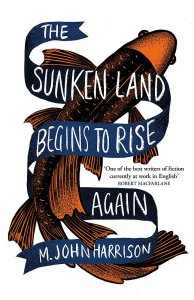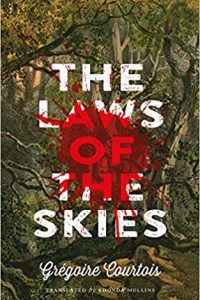Gary K. Wolfe Reviews The Sunken Land Begins to Rise Again by M. John Harrison
 The Sunken Land Begins to Rise Again, M. John Harrison (Gollancz 978-0575096356, £20.00, 272pp, hc) June 2020.
The Sunken Land Begins to Rise Again, M. John Harrison (Gollancz 978-0575096356, £20.00, 272pp, hc) June 2020.
Despite the watery spectacle implied by the title, there are no lost continents dramatically erupting from the waves in M. John Harrison’s The Sunken Land Begins to Rise Again, but there is a lot of water. The title comes instead from a rather obscure lecture called “Thoughts in a Gravel Pit” by the Victorian writer Charles Kingsley, now best remembered for his quirky and somewhat creepy fairytale The Water Babies. And The Water Babies itself pops up throughout the novel – people keep offering copies to the two main protagonists, Shaw and Victoria, and a Shropshire village to which Victoria has just moved seems strangely preoccupied with it. Furthermore, the novel is sprinkled with odd events and characters that seem to echo Kingsley’s submerged world: Victoria recalls that her father had told her of a “subspecies of people born looking like fish”; Shaw is sent to attend the trial of a man whose only offense seems to be that he insists he sees tiny green children growing in the water of toilets; Victoria sees a greenish, fetus-like growth in the water near her new home; a waitress befriended by Victoria walks into a shallow pond and disappears as though she’s walking down an underwater staircase. Apart from The Water Babies, the only book that gets significant mention is Pincher Martin, William Golding’s meditative epic about a clueless drowned sailor. It seems increasingly apparent that the England in which the characters live is undergoing some sort of psychic transformation – “myths from a geography long forgotten or not yet invented,” as Victoria muses at one point – but Shaw and Victoria seem barely aware of it since, like so many of Harrison’s protagonists, they’re largely preoccupied with trying to reconnect with their own disjointed lives.
Shaw, who has wandered through a series of aimless jobs (apparently in IT), seems a victim both of the gig economy and of Brexit, and finally washes up in a London neighborhood not far from the extended care facility where his mother, suffering from advanced dementia, never seems to be able to get his name right. He begins a desultory affair with Victoria, a doctor’s daughter with “the studiedly flat humour of a high-functioning romantic” (Harrison’s acute prose constantly invites quotation). The first several chapters of the novel describe Shaw’s new life, as he deals with mysterious noises from a next-door neighbor and eventually takes a position with an equally mysterious character named Tim (whose office is on a shabby riverboat, in keeping with the aquatic theme), performing odd tasks like delivering anonymous cardboard boxes to various shops and bookstores, attending the trial of the aforementioned old man with his visions of fish-children, or spending time with a medium named Annie. The point of view then shifts to Victoria, who has inherited her mother’s old house in Shropshire and sets about fixing it up, assisted by workmen who, not surprisingly, seem to be reading The Water Babies. Victoria befriends a local waitress named Pearl and her rather gruff and uncommunicative father, both of whom say they knew her mother. She and Pearl begin a series of day trips to nearby villages and estates, each of which seems to have some historical claim to have hosted parliament back in the middle ages, but eventually all that history and geology begins to weigh on Victoria, and Pearl’s sudden and apparently magical disappearance leaves her once again feeling disconnected.
The Sunken Land Begins to Rise Again may surprise some readers of Harrison’s more spectacular Viriconium or Kefahuchi Tract novels, but admirers of his more recent short fiction or novels like The Course of the Heart and Climbers should feel more at home. All of his fiction is distinguished by carefully crafted prose that can achieve sublime beauty even when slicing like a razor, and by characters that are somehow a lot more compelling to us than they are even to themselves. There may not be much to admire in the self-absorption and frequent obliviousness of figures like Shaw and Victoria, but there’s a good deal to identify with in their struggles to figure out where they’re supposed to be or even where they are, in an England that seems to be shifting beneath their feet, possibly transforming itself into something rich and strange. It’s easy to forget, amid all the Christian didacticism of Kingsley’s now-fading children’s classic, that it was also a Darwinesque argument in favor of evolution and transformation, and the ominous, vaguely threatening and threatened England of The Sunken Land Begins to Rise Again has more than a bit in common with Kingsley’s changing, destabilized world. Like much of Harrison’s work, it’s unsettling, brilliant, and pretty much unlike anything anyone else is doing.
Gary K. Wolfe is Emeritus Professor of Humanities at Roosevelt University and a reviewer for Locus magazine since 1991. His reviews have been collected in Soundings (BSFA Award 2006; Hugo nominee), Bearings (Hugo nominee 2011), and Sightings (2011), and his Evaporating Genres: Essays on Fantastic Literature (Wesleyan) received the Locus Award in 2012. Earlier books include The Known and the Unknown: The Iconography of Science Fiction (Eaton Award, 1981), Harlan Ellison: The Edge of Forever (with Ellen Weil, 2002), and David Lindsay (1982). For the Library of America, he edited American Science Fiction: Nine Classic Novels of the 1950s in 2012, with a similar set for the 1960s forthcoming. He has received the Pilgrim Award from the Science Fiction Research Association, the Distinguished Scholarship Award from the International Association for the Fantastic in the Arts, and a Special World Fantasy Award for criticism. His 24-lecture series How Great Science Fiction Works appeared from The Great Courses in 2016. He has received six Hugo nominations, two for his reviews collections and four for The Coode Street Podcast, which he has co-hosted with Jonathan Strahan for more than 300 episodes. He lives in Chicago.
This review and more like it in the September 2020 issue of Locus.
 While you are here, please take a moment to support Locus with a one-time or recurring donation. We rely on reader donations to keep the magazine and site going, and would like to keep the site paywall free, but WE NEED YOUR FINANCIAL SUPPORT to continue quality coverage of the science fiction and fantasy field.
While you are here, please take a moment to support Locus with a one-time or recurring donation. We rely on reader donations to keep the magazine and site going, and would like to keep the site paywall free, but WE NEED YOUR FINANCIAL SUPPORT to continue quality coverage of the science fiction and fantasy field.
©Locus Magazine. Copyrighted material may not be republished without permission of LSFF.







